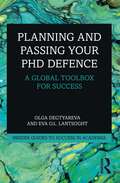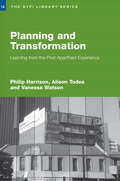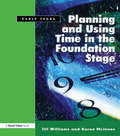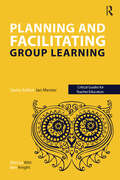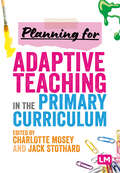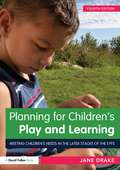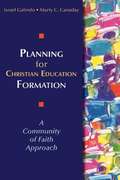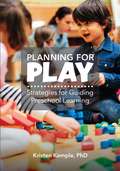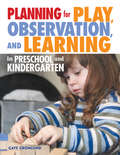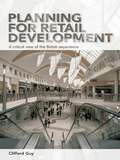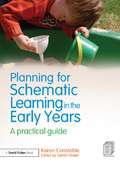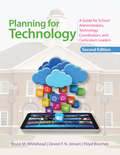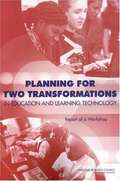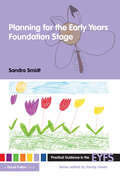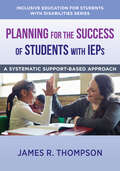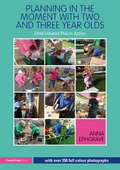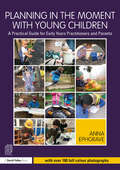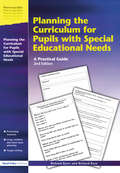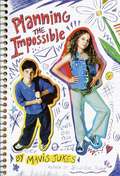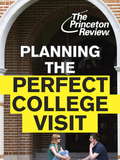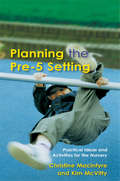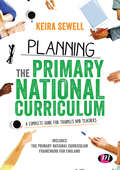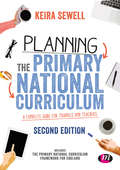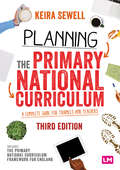- Table View
- List View
Planning and Passing Your PhD Defence: A Global Toolbox for Success (Insider Guides to Success in Academia)
by Olga Degtyareva Eva O.L. LantsoghtThe 'Insider Guides to Success in Academia' offers support and practical advice to doctoral students and early-career researchers. Covering the topics that really matter, but which often get overlooked, this indispensable series provides practical and realistic guidance to address many of the needs and challenges of trying to operate, and remain, in academia. These neat pocket guides fill specific and significant gaps in current literature. Each book offers insider perspectives on the often implicit rules of the game -- the things you need to know but usually aren't told by institutional postgraduate support, researcher development units, or supervisors -- and will address a practical topic that is key to career progression. They are essential reading for doctoral students, early-career researchers, supervisors, mentors, or anyone looking to launch or maintain their career in academia. This book is a toolbox for PhD students to plan and prepare for the PhD defence regardless of their scientific discipline or location. The authors discuss various defence formats that are used internationally and identify the main differences and similarities. With international examples, practical strategies, and tips from former PhD students and supervisors, this book unpacks the principles and unwritten rules underpinning the defence. Addressing planning and preparing for the doctoral defence, and what to do afterwards, this book covers topics such as: understanding your defence format preparing for committee questions preparing mentally and dealing with anxiety dealing with corrections, finalizing your graduation requirements and marking the end of your PhD trajectory. This book is crucial reading for students across the world looking to defend their PhD thesis, and also for their supervisors and examiners.
Planning and Transformation: Learning from the Post-Apartheid Experience (RTPI Library Series)
by Vanessa Watson Alison Todes Philip HarrisonPlanning and Transformation provides a comprehensive view of planning under political transition in South Africa, offering an accessible resource for both students and researchers in an international and a local audience. In the years after the 1994 transition to democracy in South Africa, planners believed they would be able to successfully promote a vision of integrated, equitable and sustainable cities, and counter the spatial distortions created by apartheid. This book covers the experience of the planning community, the extent to which their aims were achieved, and the hindering factors. Although some of the factors affecting planning have been context-specific, the nature of South Africa’s transition and its relationship to global dynamics have meant that many of the issues confronting planners in other parts of the world are echoed here. Issues of governance, integration, market competitiveness, sustainability, democracy and values are significant, and the particular nature of the South African experience lends new insights to thinking on these questions, exploring the possibilities of achievement in the planning field.
Planning and Using Time in the Foundation Stage
by Karen McInnes Jill WilliamsOperating on two levels, this book aims to help students and practitioners understand how to plan and use time effectively within the foundation stage setting. The book examines how children learn and play at different times of day, how they fiction when they might be tired or hungry and how best to organize the learning day with this in mind. The authors discuss the issue of environment, how children relate to different areas within their own room, and what happens when routines of time and place are altered. The book also discusses how to develop children's understanding of time and how to incorporate the theme of time into children's play. The book includes: practical activities and examples that will allow children to fully comprehend the concept of time advice on how to create time for children to learn through play, inquiry and investigation sections on how time can be used to include parents, colleagues and the local community. This book provides in-depth analysis of how effective use of time can be beneficial for parents, children and staff in early years setting.
Planning and facilitating group learning (Critical Guides for Teacher Educators)
by Ben Knight Marcus WittThis is an innovative text for teacher educators exploring detailed research and information that novice teachers need to know about group work in school settings. There is more to learn about group work than simply sitting children together and letting them get on with it! Group work across schools is very common and trainee teachers will step into classrooms where small groups are a predominant structure. Research has suggested that there is a great deal more to understand about group work, however there is a tacit presumption in ITE that trainee teachers will simply pick up the expertise associated with organising and managing group work. This book aims to fill in the gaps and educate trainee teachers on the subtleties and complexities of group work to ultimately make their teaching more impactful and effective.In this accessible and informative guide, the authors delve into the existing research on how children learn in collaborative groups and what trainee teachers need to learn and understand about planning and executing group learning. It examines the skills teacher educators should aim to develop in pre-service teachers to help them build expertise in this important area. Following other books within the series, this book is packed with case studies and opportunities for critical thinking.
Planning for Adaptive Teaching in the Primary Curriculum
by Charlotte Mosey Jack StothardHow do I plan for Adaptive Teaching in the primary National Curriculum? Do different subjects need a different Adaptive Teaching approach? How do I anticipate the needs of the children in my class and plan for them in all curriculum subjects? Planning for Adaptive Teaching in the Primary Curriculum helps you to answer these questions. It is a practical guide for trainee and beginning teachers, showing you how to begin, develop and perfect planning for Adaptive Teaching. The book covers the foundation principles of Adaptive Teaching and outlines why it matters. It includes a chapter for every curriculum subject because what works in mathematics, might not work in PE. Throughout, examples of good practice, ideas and suggested topics are included to help you to build a range of strategies to use for planning and teaching.
Planning for Adaptive Teaching in the Primary Curriculum
by Charlotte Mosey Jack StothardHow do I plan for Adaptive Teaching in the primary National Curriculum? Do different subjects need a different Adaptive Teaching approach? How do I anticipate the needs of the children in my class and plan for them in all curriculum subjects? Planning for Adaptive Teaching in the Primary Curriculum helps you to answer these questions. It is a practical guide for trainee and beginning teachers, showing you how to begin, develop and perfect planning for Adaptive Teaching. The book covers the foundation principles of Adaptive Teaching and outlines why it matters. It includes a chapter for every curriculum subject because what works in mathematics, might not work in PE. Throughout, examples of good practice, ideas and suggested topics are included to help you to build a range of strategies to use for planning and teaching.
Planning for Children’s Play and Learning: Meeting children’s needs in the later stages of the EYFS
by Jane DrakeThis new edition of Planning for Children’s Play and Learning has been fully updated to reflect the revised Early Years Foundation Stage and in line with current policy and practice. It recognises the importance of play as a context for teaching, learning and assessment and links theory with practical examples to show practitioners how they can best support the children in their care. With new material on learning stories, language development, ICT and the home learning environment, the book includes practical guidance and ideas on: • creating stimulating learning environments indoors and out • planning exciting focus activities and experiences • responding to children’s individual interests and supporting personalised learning • sound observational practice and how to assess children’s learning and development within the EYFS framework • developing genuine partnerships with parents and learning links with home. Incorporating ‘Key Points for Good Practice’ within each chapter, and direct links to the EYFS, this is a key text for all practitioners working with children in the later stages of the EYFS. It is also ideal for students pursuing Qualified Teacher Status in the Early Years and EYT Status, and for those enrolled in courses in Early Childhood Studies and Foundation Degrees in Early Years.
Planning for Christian Education Formation
by Israel Galindo Marty C. CanadayThis book was written to help congregational leaders, clergy, staff, and laypersons, plan and organize a Christian education ministry from the approach of Christian formation in a community of faith context. This book provides a model for organizing the Christian education leadership committee or team of the church, demonstrates how to use the church year as a framework for planning the Christian education ministry of the church, and gives a model for assessing the effectiveness of the educational ministry of the church and a process to help congregations move toward the Christian Education Formation approach.
Planning for Play
by PhD Kristen M. KemplePlay is learning! But play in the early years is endangered by the emphasis on push-down academics, mounting parental expectations, and pressures on early childhood teachers to prepare young children for the rigors of kindergarten and beyond. With all of that, gains made by play experiences, including readiness skills and social-emotional development, have fallen away. Young children learn best through play. Planning for Play helps educators understand the different types of play and the rich opportunities offered through carefully planned time and environments designed for valuable pre-K play experiences. Learn how to get the most out of the play in your classroom: How to support play without controlling it How to guide play toward important concepts and skills How to use materials to provoke rich play How to get a reluctant child to play with peers And so much more!
Planning for Play, Observation, and Learning in Preschool and Kindergarten
by Gaye GronlundPlay is an important vehicle for learning in the early years. With intentional planning frameworks, this resource provides teachers with tools and strategies to organize and develop curriculum around high-level, purposeful play. Practical application techniques help teachers create a cycle of planning and observation as they use a play-based curriculum to help young children thrive in the classroom.Gaye Gronlund is an early childhood education consultant who trains early childhood educators across the country. She is the author of six books.
Planning for Retail Development: A Critical View of the British Experience
by Clifford GuyWritten by a leading expert in the field, this is the first thorough critical review of retail planning policy in Britain (including Scotland and Wales). It covers recent changes in government policy and guidance, and examines retail policy within a broader economic and social context. Planning for Retail Development explains key events and debates in the evolution of retail planning policy, at central and local government levels, since the 1960s and draws contrasts between the 1980s, a period in which retail developers were encouraged by central government to expand away from town centres, and the more recent emphasis on protection and promotion of town centres as the most appropriate location for new development. The book develops a critical evaluation of past and present retail planning policies, based upon analyses of retailers’ objectives and of typical consumer shopping behaviour. Relationships between retail planning and wider societal concerns, including sustainable development, social inclusion and urban regeneration are also examined and analysed and guidelines for future policy objectives and content are drawn.
Planning for Schematic Learning in the Early Years: A practical guide
by Karen ConstableWhat are schemas and why should you know about them? How can schemas be identified in young children? What does schematic learning look like and how does it meet the needs of individual children? All children are different, they look different, sound different, behave in different ways and crucially they learn differently. It is a constant challenge in Early Years settings and Reception classes to provide opportunities that are relevant and valuable for all the children. Being able to recognise and identify schemas in young children enables practitioners to plan a play-based curriculum that allows for individualised learning based around each child’s interests that will support the next steps of their development. Drawing on current research, the book clearly explains what schemas are and how they can be identified in children. Looking at how settings can plan to incorporate schemas into their schemes and topics and providing real life examples of schematic learning in practice, features include: Examples of schemas alongside descriptions of common behaviour patterns A chapter on using schemas to support children with additional needs Photocopiable key checklists to help identify different schemas Guidance on developing schemas to support children in their next steps Advice on using schemas to aid the transition to Key Stage 1 Including case studies and photographs to illustrate practice, this highly practical book aims to inspire practitioners, teachers and students to be creative in the way they work with children and ensure the best for those in their care.
Planning for Technology: A Guide for School Administrators, Technology Coordinators, and Curriculum Leaders
by Bruce M. Whitehead Dr Floyd A. Boschee Devon JensenStay a step ahead of technological change so that every student can flourish! Students and classrooms are growing more technologically savvy every semester, and falling behind is not an option. This new edition of an essential text shows educational leaders how to equip their students for the future, with updates such as: Digital developments of the past decade that school leaders must address New content covering the Common Core, distributed leadership, adult learning theory, digital citizenship, cybersecurity, cloud computing, and more A new chapter on creating a “culture of technology” that goes beyond mere user manuals to create responsible, tech-savvy students
Planning for Two Transformations in Education and Learning Technology: Report of a Workshop
by Information Technology Committee on Improving LearningIn response to concerns about the continued unrealized potential of IT in K-12 education, the National Research Council’s Division of Behavioral and Social Sciences and Education, Center for Education (CFE), Board on Behavioral, Cognitive, and Sensory Sciences (BBCSS), and Computer Science and Telecommunications Board (CSTB) undertook a collaborative project to help the IT, education research, and practitioner communities work together to find ways of improving the use of IT in K-12 education for the benefit of all students.
Planning for the Early Years Foundation Stage (Practical Guidance in the EYFS)
by Sandra SmidtThe Practical Guidance in the Early Years Foundation Stage series will assist practitioners in the smooth and successful implementation of the Early Years Foundation Stage. Each book gives clear and detailed explanations of each aspect of Learning and Development and encourages readers to consider each area within its broadest context to expand and develop their own knowledge and good practice. Practical ideas and activities for all age groups are offered along with a wealth of expertise of how elements from the practice guidance can be implemented within all early years settings. The books include suggestions for the innovative use of everyday ressources, popular books and stories. Planning for the Early Years Foundation Stage complements the six Learning area books in this series by explaining the basis of clear planning and how it links to careful observation and assessment. Useful examples are provided throughout, Planning across the Early Years Foundation Stage will raise awareness of what is needed within early years settings, explain the who, when and whys of observation, assessment and planning, and making useful links to each of the other books in the series.
Planning for the Success of Students with IEPs: A Systematic, Supports-based Approach (Inclusive Education for Students with Disabilities #0)
by James R. ThompsonA great special educator is an expert problem-solver. The difficulties that students with individual education plans (IEPs) encounter in general education classrooms are rarely impossible to overcome. What is required to help them succeed is figuring out the individualized supports they need, whether that involves accessing technology, receiving assistance from a peer or adult, or curricular and assignment adaptations. In this comprehensive handbook from The Norton Series on Inclusive Education for Students with Disabilities, James R. Thompson synthesizes the work of a team of experts to provide a roadmap for that problem-solving process. The Systematic Supports Planning Process is structured around three central questions that lead to identifying different types of support: • “What to teach?”—curricular adaptations • “How to teach?”—instructional supports • “How to promote participation?”—participation supports Packed with easy-to-follow guidelines, as well as implementation tools and examples, this book is a one-stop reference for planning, delivering, monitoring, and evaluating the supports that students with IEPs require.
Planning in the Moment with Two and Three Year Olds: Child-initiated Play in Action
by Anna EphgraveChildren are most engaged – and therefore learn best – when they are following their own interests. In this book, Anna Ephgrave shows how her acclaimed ‘planning in the moment’ approach can be used with two and three year olds with dramatic results for both children and staff. It reveals the impact that free-flowing, child-initiated play has on very young children’s wellbeing, making them feel safe, secure and consequently helping them to be fully engaged in their learning. The first part of the book clearly explains the principles of child-initiated play and demonstrates how practitioners can create the best possible environment for very young children, also looking at the resources and practices that need to be in place for them to flourish. There is detailed guidance on the role of the practitioner, including how adults should observe children’s play, before deciding how – or if – to interact in that moment to ensure that each interaction moves learning forward and supports the child’s unique development. The second part of the book tracks some of the events from each month in the toddler room of an outstanding preschool, following a cohort of children through a year, to show how the setting moved from topic-based, adult-led activities to a fully child-led way of working. Key features include: Over 350 full colour photos to illustrate practice Specific guidance on using the ‘in the moment’ approach with all children, including those with additional needs Advice on working with parents, individual children and groups Examples of individual learning journeys Photocopiable templates of ‘focus-child’ sheets Covering all aspects of practice from the organization of the room and outdoor environment to the routines and boundaries that ensure children are safe and happy, this book is essential reading for anyone who works with two and three year olds.
Planning in the Moment with Young Children: A Practical Guide for Early Years Practitioners and Parents
by Anna EphgraveYoung children live in the here and now. If adults are to make a real difference to their learning they need to seize the moments when children first show curiosity, and support their next steps immediately. This book embraces the concept of planning "in the moment" and emphasises the critical role of the adult in promoting child-led learning, giving early years practitioners the confidence and insight to work and plan in the moment, and enabling the children in their care to live, learn, play and develop in the here and now. Planning in the Moment with Young Children maintains a strong link to practice, providing numerous examples of how practitioners can integrate spontaneous planning and rich adult–child interactions into their everyday practice and early years curricula. From timetabling to setting clear rules, creating enabling environments, keeping records and making use of a variety of materials, the book demonstrates the multitude of ways in which practitioners can encourage child autonomy and respond to the unique needs of each child. Examples from practice are rooted in theory, fully contextualised, and exemplified by original documentation sourced from the author’s own experiences and from a wide variety of settings. Key features include: over 180 full colour photographs to illustrate practice; photocopiable pages including planning sheets, documentation and activity sheets; advice on working with parents, individual children and groups; tailored guidance on working with children at different stages of development from birth to age 6 years; relevance to a range of settings, including childminders, pre-schools, nurseries and schools. When children are allowed to select where, with what, and how to play, they are truly invested in their play, they become deeply involved and make dramatic progress. This book is an outstanding testament to a responsive and child-led way of working in early years environments. Practitioners will be guided, inspired and supported to work spontaneously and reactively – planning as they go and celebrating the results!
Planning the Curriculum for Pupils with Special Educational Needs: A Practical Guide (Resource Materials for Teachers)
by Richard Rose Richard ByersThis second edition is revised and updated to take full account of recent developments in special needs. The core of the book focuses on planning for well-differentiated curriculum implementation. It describes a variety of models that explore progression, continuity, relevance and inclusion for pupils with special educational needs. The authors also offer an analysis of curriculum management issues in the light of the theoretical and statutory background since the latest revisions of the National Curriculum and the Code of Practice.
Planning the Impossible
by Mavis JukesUgh! Mrs. Furley wanted the Human Interaction Class to discuss a boy's changes? Twelve-year-old River was having a hard enough time just figuring out how to humanly interact with the real people in her life. Like, she was happy that D. B. was her sort-of boyfriend, but now Kirstin was always flirting with him! And River was happy her friend Margaret had found a boyfriend, but then Noah passed River a note asking her to phone him at home. What was that about? Sure River wanted to keep Kirstin from D. B. and Margaret with Noah, but did it all have to be so confusing? Notes passed from girls to boys and boys to girls and girls to girls, dating and mating, flirting and posing--River could never have guessed that talking to a boy would be so difficult.
Planning the Perfect College Visit
by Princeton ReviewHow will you decide where to go to college? Visiting campus is the best way to understand what life is really like at a particular school, whether that school is close to home or across the country, a big university or a small liberal arts college. In Planning the Perfect College Visit?: Advice for Before You Go & Questions to Ask When You're There, the experts at the Princeton Review give you the tools you need to maximize what you can learn on campus. Inside this concise but thorough short ebook, you'll read about the best time to plan a trip to campus, what you should do while you're there, and how to evaluate what you find. You'll also find a "cheat sheet" with the most important questions to ask about a variety of topics, including: · Applying/Admissions · Academics · Administration · Dorms/Housing · Food · Extracurricular and Social Activities · Athletics · Technology · Surrounding Town · Transportation · Study Abroad · Financial · Internship/Careers · Politics · Religion · Holidays/Festivities · Campus Media · Students · Alumni · Campus/Facilities · And much more! In addition to containing guidelines for parents and students and a 9-step plan for planning a great campus trip, Planning the Perfect College Visit also contains a special section with tips on visiting military academies, women's colleges, and Historically Black Colleges and Universities (HBCUs).
Planning the Pre-5 Setting: Practical Ideas and Activities for the Nursery
by Christine Macintyre Kim McVittyWritten for teachers, nursery nurses, students and parents by experienced nursery staff, this is an essential guide to organizing, resourcing and teaching in pre-school settings.
Planning the Primary National Curriculum: A complete guide for trainees and teachers
by Keira SewellTo prepare to teach the new Primary National Curriculum, you need more than just the Programmes of Study. You need a resource to help you understand, plan for, teach and assess the curriculum. This is it! Your guide to planning the 2014 primary national curriculum. This book explores how to plan in primary schools. It covers curriculum design and structure, challenges to learning, and how children learn. For each curriculum subject the programme of study is included, with notes to help you interpret it for your own class. The text covers how the teaching of each subject can be organised, assessment opportunities, key and essential resources in each subject, and how ICT can best be used in each subject to enhance teaching. Sequenced lesson examples in all subject chapters link theory to practice and highlight progression. The final section of the book explores the many ways in which the curriculum can be delivered. The creative curriculum, dialogic teaching, cross curricular learning and more current thinking about interpreting the curriculum.
Planning the Primary National Curriculum: A complete guide for trainees and teachers
by Keira SewellA complete guide for trainees and teachers To prepare to teach the new Primary National Curriculum, you need more than just the Programmes of Study. You need a resource to help you understand, plan for, teach and assess the curriculum. This is it! Your guide to planning the Primary National Curriculum. This book explores how to plan in primary schools. It covers curriculum design and structure, challenges to learning, and how children learn. New in this edition is a chapter on planning for mastery. For each curriculum subject the programme of study is included, with notes to help you interpret it for your own class. The text covers how the teaching of each subject can be organised, assessment opportunities, key and essential resources in each subject, and how ICT can best be used in each subject to enhance teaching. Sequenced lesson examples in all subject chapters link theory to practice and highlight progression. The final section of the book explores the many ways in which the curriculum can be delivered. It includes the creative curriculum, dialogic teaching, cross-curricular learning and more current thinking about interpreting the curriculum.
Planning the Primary National Curriculum: A complete guide for trainees and teachers (Ready to Teach)
by Keira SewellA complete guide for trainees and teachers To prepare to teach the new Primary National Curriculum, you need more than just the Programmes of Study. You need a resource to help you understand, plan for, teach and assess the curriculum. This is it! Your guide to planning the Primary National Curriculum. This book explores how to plan in primary schools. It covers curriculum design and structure, challenges to learning, and how children learn. New in this edition is a piece on Decolonising the Curriculum. For each curriculum subject the programme of study is included, with notes to help you interpret it for your own class. The text covers how the teaching of each subject can be organised, assessment opportunities, key and essential resources in each subject, and how ICT can best be used in each subject to enhance teaching. Sequenced lesson examples in all subject chapters link theory to practice and highlight progression. The final section of the book explores the many ways in which the curriculum can be delivered. It includes the creative curriculum, dialogic teaching, cross-curricular learning and more current thinking about interpreting the curriculum.
